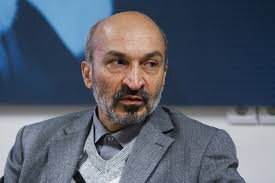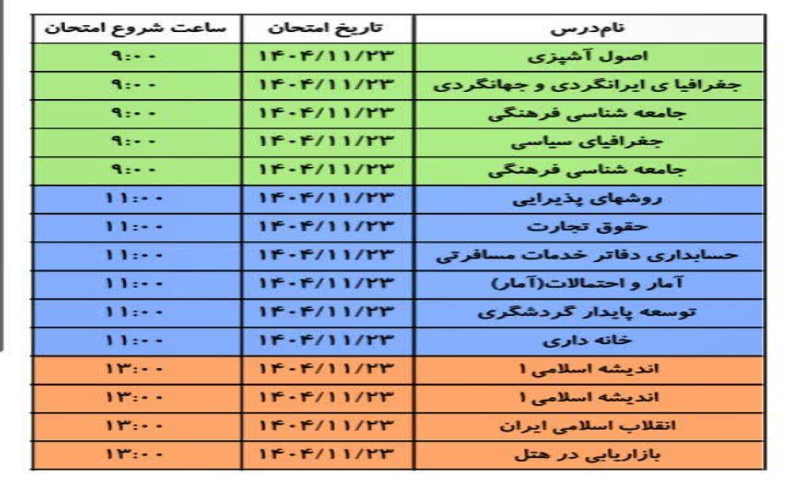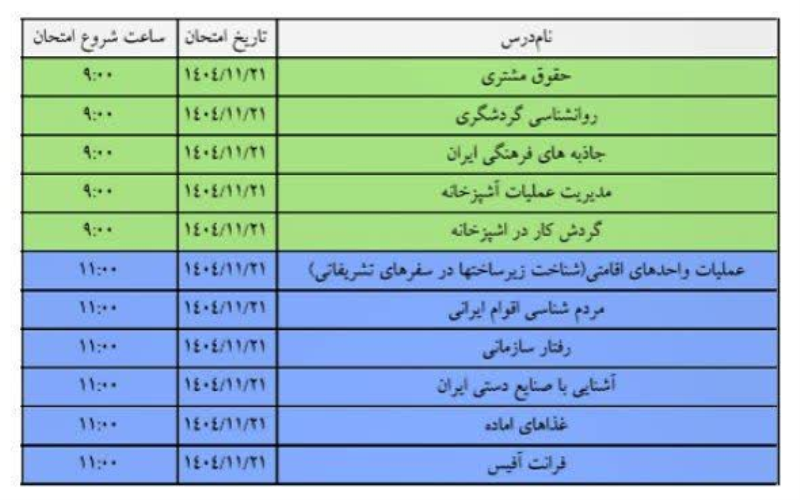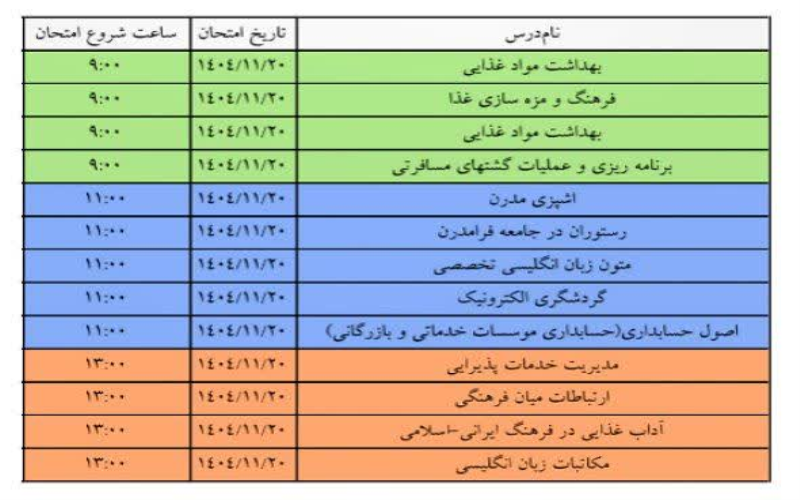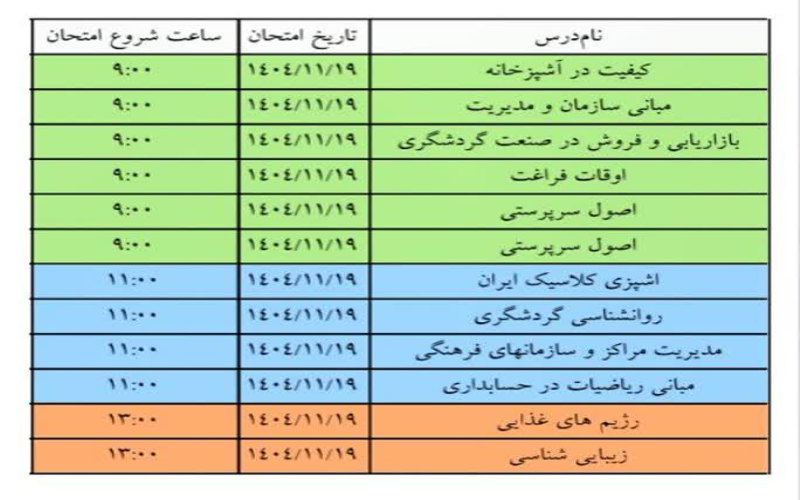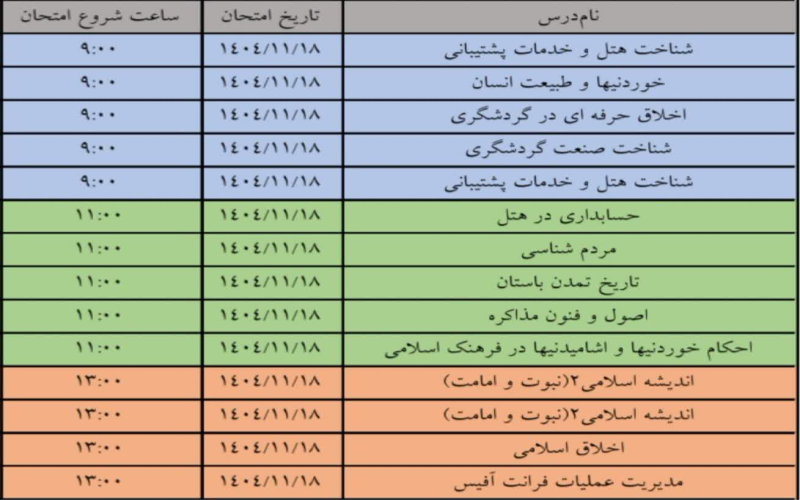اطلاعیه
- اعلام ضوابط و شیوه برگزاری امتحانات 23 بهمن
- اعلام ضوابط و شیوه برگزاری امتحانات 21 بهمن
- اعلام ضوابط و شیوه برگزاری امتحانات 20 بهمن
- اعلام ضوابط و شیوه برگزاری امتحانات 19 بهمن
- اعلام ضوابط و شیوه برگزاری امتحانات 18 بهمن
- اعلام ضوابط و شیوه برگزاری امتحانات 17بهمن
- اعلام ضوابط و شیوه برگزاری امتحانات 16بهمن
- دانشآموزان هنرستان عارفه در تجربه عملی پردیسان
- دانشآموزان هنرستان هما در پردیسان
- درخشش ورزشی دانشجوی پردیسان در استان
- اعلام ضوابط و شیوه برگزاری امتحانات ۱۴ بهمن
- تجلیل از فعالان فرهنگی و پژوهشی مرکز پردیسان
- افتخار آفرینی دانشجوی پردیسان در رقابت های ورزشهای زورخانه ای مشهد
- نشست مسئولان مرکز با مدیران مدارس
- نشست هماندیشی مدیران گروه
- تعویق در امتحانات 4 و5 بهمن
- لغو برگزاری آزمونها
- آموزش فرامدرن صنعت غذا با نمایشگاه عملی در کلاس
- بازدید میدانی دانشجویان گردشگری از آثار تاریخی و فرهنگی
- درخشش دانشجویان مرکز در نمایشگاه و کارگاه آشپزی
- اکتشاف میدانی دانشجویان هتلداری در هتل گلدن پالاس
- نگاهی نزدیک به دنیای هتلداری
- بازدید علمی درس شناخت هتل
- پویش آموزشی هتلداری در گلدن پالاس
- درس زیباییشناسی با رویکردی نو برای دانشجویان کاردانی آشپزی
- یک روز تجربه عملی در هتل گلدن پالاس
- بازنمایی آیین یلدا در درس زیباییشناسی و آداب غذایی
- تجربه میدانی دانشجویان پردیسان از چیدمانهای ویژه یلدا در هتل پردیسان
- تجربه علمی ـ پژوهشی دانشجویان پردیسان در موزه بزرگ خراسان رضوی
- موفقیت دانشجوی پردیسان در جشنواره غذا
- یادگیری مسیر شادی و رشد فردی در کارگاه تخصصی پردیسان
- راهکارهای کاهش سموم حرارتی و آلایندهها؛ سمیناری تخصصی در پردیسان
- توانمندسازی پژوهشگران با کاربردهای عملی هوش مصنوعی در پژوهش علمی
- چالش تا آرامش: تجربهای کاربردی در مدیریت بحران
- تقویت مهارتهای فردی و حرفهای با کارگاه الگوهای رفتاری در پردیسان
- برگزاری دوره تخصصی فرمولاسیون مواد غذایی در هفته پژوهش پردیسان
- گزارش کلاس کالیگرافی – مرکز علمیکاربردی پردیسان
- تیم تشریفات پردیسان، قلب تپنده جشن روز دانشجو
- لحظاتی پرانرژی از آیین روز دانشجو در مرکز علمیکاربردی پردیسان
- معرفی توانمندیهای علمی و فرهنگی پردیسان در نمایشگاه بینالمللی
- مهارت و مشارکت دانشجویان آشپزی در جشن روز دانشجو
- اجرای مسابقه کتابخوانی دانشجویی
- نمایشگاه آثار پژوهشی اساتید پردیسان تمدید شد
- نمایشگاه هفته پژوهش – غرفه علمی کاربردی پردیسان
- دوره تخصصی «آشنایی با فرمول حال خوب»
- اولین گامهای هنرجویان در مسیر خلق آثار بومی و خلاق
- سمینار تخصصی «سموم پنهان در حین حرارتدهی و کنترل آن»
- کارگاه تخصصی «فرمولاسیون مواد غذایی؛ از ایده تا درآمد»
- ورکشاپ تخصصی «استراتژیهای ارتباطی در بحران
- کارگاه تخصصی «کاربردهای هوش مصنوعی در پژوهش علمی»
- کارگاه تخصصی «مدیریت الگوهای رفتاری و مدیریت ارتباطات»
- اطلاعیه برگزاری جشن روز دانشجو – مرکز علمیکاربردی پردیسان
- بازدید آموزشی دانشجویان از هتل انتخاب
- لحظاتی شاد با تبریک روز دانشجو
- گام در دنیای واقعی هتلداری
- سفر آموزشی به قلب خدمات هتل انتخاب
- روز دانشجو؛ روز طلوع اندیشه
- پیام تبریک معاونت فرهنگی مرکز پردیسان به مناسبت روز دانشجو
- روز حسابدار؛ تجلیل از نقشآفرینان نظم اقتصادی
- همایش دوچرخهسواری؛ همراهی دانشجویان و نشاط دانشجویی
- تجربه نزدیک دانشجویان از روند حرفهای کار در آشپزخانه صنعتی
- نمایشگاه کتاب در موزه بزرگ خراسان
- گامهای عملی دانشآموزان هتلداری در دنیای واقعی هتلها
- تجربه عملی آموزشهای تئوری در محیط واقعی
- همفکری و نوآوری در مسیر کارورزی دانشجویان بازنگری و بهبود فرآیند کارورزی
- از تئوری تا عمل: بازدید از دانشجویان در بخش لاندری
- ارزیابی میدانی روند کارورزی در هتل پردیسان
- برگزاری جلسه آموزشی کارورزان هتل پردیسان
- شرحنامه آموزشی
- چند سطر کوتاه، تجربهای بزرگ
- همایش دوچرخه سواری در مرکز پردیسان
- نقشآفرینی تیم تشریفات در آیین نودانشجویان
- نودانشجویان ورودی مهر 1404
- آغاز ثبتنام ورودیهای مهرماه ۱۴۰۴ در مرکز آموزش عالی پردیسان
- گام به دنیای تولید صنعتی
- اساتید مرکز پردیسان در بیست و دومین المپیاد کشوری آشپزی
- همکاری پردیسان و اتحادیه خشکشویی در برگزاری دوره لاندری
- نشست توجیهی کارورزی؛ پیوند آموزش و تجربه
- تجربه عملی دانشجویان در هتل پردیسان
- از کلاس تا هتل: آغاز دوره کارورزی دانشجویان
- ورزش، نغمهی همدلی و تندرستی
- ارتقای مهارت عملی دانشجویان در هتل پردیسان
- مرکز پردیسان دوره تخصصی لاندری و خشکشویی را برنامه ریزی کرد
- گرامیداشت روز حافظ شیرازی
- گرامیداشت اراده و شکوفایی
- روزی برای تجلیل از دانشگاهی در خدمت کارآفرینی و دانایی
- آغاز همکاریی تازه برای مهارتآفرینی و اشتغال در صنعت لاندری
- معاون فرهنگی و دانشجویی مرکز پردیسان خبر داد
- حضور فعال تیم تشریفات مرکز پردیسان در بزرگترین رویداد فرهنگی کشور
- قرصتی برای نوآوری در آموزش و مهارت افزایی رشته آشپزی
- ایدهسازی و همافزایی؛ جلسه هماندیشی برای ارتقای برند و آموزش
- آیین اختتامیه بیستمین جشنواره قرآن و عترت
- دیدار رئیس دانشگاه جامع علمیکاربردی کشور با رؤسای مراکز خراسان رضوی
- تحولی تازه در آموزش مهارتی
- هماندیشی اساتید گردشگری
- از ایده تا اجرا؛ هماندیشی تخصصی برای ارتقای کیفیت آموزش زبان انگلیسی
- رقابت علمی ـ فرهنگی دانشجویان در مسابقه آنلاین هفته گردشگری
- پاسداشت هنر ترجمه در کلام رئیس مرکز پردیسان
- همافزایی استادان هتلداری
- پاسداشت هفته دفاع مقدس
- رویداد المپیاد صنایع غذایی در استان
- کسب مقام دانشجویان پردیسان در بیستودومین مسابقات المپیاد رشتههای صنایع غذایی
- گزارش گفتوگوی تخصصی مرکز علمیکاربردی پردیسان
- جلسه هم اندیشی جذب دانشجویان مهر ماه
- آغاز ثبتنام ترم مهر ۱۴۰۴ – مرکز آموزش علمیکاربردی پردیسان
- برگزاری نشست هماندیشی کارکنان مرکز علمیکاربردی پردیسان
- فرجام درخشان امتحانات
- بازگشت پرشکوه دانش به پردیسان؛ امتحانات پس از سه ماه وقفه آغاز شد
- زمانبندی جا به جایی امتحانات نیمسال دوم
- نشست هماندیشی و هماهنگی دورههای کوتاهمدت
- شرح نشست دوم شورای تعامل و تبادل نظر رؤسای مراکز علمیکاربردی استان خراسان رضوی
- رویداد نگاری نشست آموزشی
- نگاهی ژرف به نشست آغازین کارورزی
- کارگاه تخصصی کیک های کافیشاپ
- پروژه عملی درس «غذاهای آماده»
- اطلاعیه مهم شماره ۲ امتحانات
- «مهم: وضعیت امتحانات پایان ترم»
- برگزاری آزمون عملی درس خانهداری
- تمرین حرفهایگری در فضای واقعی هتل
- برگزاری آیین تودیع و معارفه مدیران گروههای آموزشی مرکز علمی کاربردی پردیسان
- برگزاری آزمون درس "آشپزی کلاسیک ایران ۱"
- برگزاری آزمون درس «غذاهای گیاهی»
- نمایش خلاقیت و مهارت در آزمون عملی پایان دوره تزئین خوردنیها
- آشنایی دانشجویان هتلداری با ساختار اجرایی هتل چهارستاره انتخاب
- آشنایی میدانی دانشجویان هتلداری با فضای واقعی صنعت میزبانی در هتل ستاره خلیج فارس
- خانهداری حرفهای از نزدیک؛ تجربهای واقعی در قلب یک هتل پنجستاره
- تجربهای نزدیک از استانداردهای پذیرش هتل؛ فرانت آفیس در عمل
- تجربهای ملموس از استانداردهای حرفهای در صنعت هتلداری
- گزارش بازدید علمی دانشجویان کاردانی هتلداری از هتل انتخاب
- گزارش حضور علمی در مجموعه غذایی قصر سلطان
- بازدید دانشآموزان هنرستان زیناوقلی از مرکز علمی کاربردی پردیسان،
- بازدید آموزشی دانشجویان پردیسان از هتل رونا
- بازدید علمی از موزه مردمشناسی مهدیقلیبیگ
- گزارش حضور در جشنواره تاکپلو –شهرستان خلیلآباد تاریخ برگزاری: دوم خرداد ۱۴۰۴
- برگزاری جلسه آموزشی عملی درس "فنون و مهارتهای راهنمایان گردشگری"
- برگزاری دوره کوتاهمدت "کوکی تخصصی" در مرکز علمی کاربردی پردیسان
- بازدید معاونت فرهنگی مرکز علمی کاربردی پردیسان از نمایشگاه بین المللی گردشگری و صنایع دستی خراسان رضوی
- گزارش بازدید علمی از نمایشگاه بینالمللی گردشگری و صنایعدستی خراسان رضوی
- بازدید آموزشی از قصر لیوسا دانشجویان رشته آشپزی
- بازدید دانشجویان گردشگری مرکز پردیسان از هتل بینالمللی قصر
- بازدید علمی دانشجویان از هجدهمین نمایشگاه بینالمللی گردشگری و صنایع دستی خراسان رضوی
- گزارش برگزاری جشن بزرگداشت روز معلم مرکز علمی کاربردی پردیسان
- بزرگداشت حکیم ابوالقاسم فردوسی
- بازدید آموزشی دانشجویان رشته گردشگری مرکز علمی کاربردی پردیسان از باغ نادری مشهد
- گزارش بازدید آموزشی دانشجویان کاردانی هتلداری مرکز علمی کاربردی پردیسان از گروه تولیدی و تجهیزات هتلی شایسته
- کارگاه تخصصی کوکی
- کارگاه آموزشی سفر های خلاقانه و پایدار
- تبریک معاونت فرهنگی دانشجویی مرکز علمی کاربردی پردیسان ، گرامی داشت مقام معلم
- تبریک ریاست مرکز علمی _کاربردی پردیسان به اساتید مرکز گرامی داشت روز معلم
- گزارش جلسه توجیهی ویژه نودانشجویان ورودی بهمن 403
- اولین جلسه شورای تعامل و هماندیشی رؤسای مراکز علمی کاربردی استان خراسان رضوی
- اولین نشست هم اندیشی فرهنگی دانشگاه پردیسان در سال جدید
- ☕️دوره تخصصی قهوه، باریستا و مدیریت کافی شاپ☕️
- بازدید آموزشی دانشآموزان هنرستان هما از هتل پردیسان و دانشگاه پردیسان انجام شد
